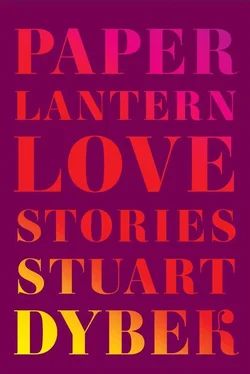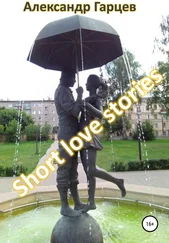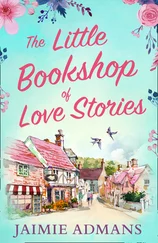“I wonder if we set our stuff high enough on the beach,” Bryan said.
“You’re limping,” Mariel said. “Do you want to turn back?”
He’d sliced the ball of his foot on a jagged shell, but he knew, once she was on a quest, Mariel refused to give it up. “I’m not limping,” he said.
“You’re not? Then what do you call it?”
“Being Byronic.”
“Look!” she exclaimed, shading her eyes and pointing ahead. “What is that?”
“A lifeguard chair?”
“The height of the Eiffel Tower?”
“We’ll make it our boundary,” he said. “We’ll walk that far, climb up, and if we don’t see a horse or a stable from there, we head back.”
“Deal,” Mariel said. “Why’s a lifeguard tower still up? I thought once the beaches officially close they take those in with the rowboats and the volleyball nets. I still remember that feeling of summer vanishing overnight—everything gone including the lifeguards, all those hunky guys named Robbie and Tad my girlfriends and I had crushes on. We’d go to the beach in the bikinis we bought hoping they’d notice.”
“You ever actually go out with one?” It would have been a routine question, except that Mariel so seldom mentioned men it seemed as if she were sharing a confidence. Bryan wanted her to keep talking.
“I had a serious love affair my sophomore year in high school, with Robbie—he didn’t have a last name. None of us did. I’d spread my towel near his lifeguard chair, lie on my stomach, and untie my bikini straps. Our climactic moment came when I was eating a hot dog and Robbie said: ‘You’ve got a dot of mustard on your face. Let me get that for you.’ And he kissed my cheek and went, yummm . That was on the day before the beaches closed. ‘See you next year, Pancake,’ he said, and I ran into the water so he wouldn’t see me burst into tears.”
“Pancake?”
“As in flatter than.”
“No way. So, did you see him the next year?”
“I dreamed of him all winter. I turned my pillow into Robbie, but by spring I’d sprouted breasts and was into tennis players. Our town hosted a qualifier for the Junior Nationals, and that next summer I had my first sexual experience, if you call giving a tennis brat a hand job … Oh, my God, that was Bummer Summer! The beach was off-limits. I’d completely forgotten that.”
“Red tide? E. coli?”
“A girl drowned.” Mariel pronounced it drownded . Maybe it was a local accent that he hadn’t noticed before. Maybe he’d never heard her use the word until then.
“A close friend?”
“I didn’t know her but to say hi. She was a loner, shy, withdrawn, one of those girls who makes you think anorexia might be a fatal self-absorption. I don’t think she had any friends. Her drownding was a shock—like when any young person dies—but the reason kids stopped going to the beach was that these creepy stories started going around.”
“Like what?”
“Look at the birds around the lifeguard chair—must be thousands!” Mariel said. “Maybe we’re extras in a nature film on mass migration. What all are they?”
“Gulls, willets, sandpipers, cormorants, oystercatchers, curlews. What kind of stories did they tell about her?”
“That she had a thing for lifeguards—not just crushes, an obsession. She’d wear a skimpy hot-pink bikini, and swim out, ignoring the whistle, and pretend to be drownding. The lifeguard would have to pull her out of the water and she’d be like unconscious. Kids claimed she was doing that all up and down the beaches to get the lifeguards to give her mouth-to-mouth. It was awful how they talked about her. She died because one lifeguard thought she was crying wolf when she really was caught in an undertow. By the time he realized she was in trouble and rowed out, she’d gone under. The guy who didn’t save her tried to take his own life by stepping on an electric rail. His legs were horribly burned, but he didn’t die. They searched for a week but never found her body. Nobody wanted to go to the beach. They made up sick stories—as if being morbid disguised their fear—stories about a beach where kids went to get high at night and skinny-dip, where they heard a girl singing, before her body washed in, all luminescent and rotted and fish-eaten. I’m sorry I’ve remembered any of it. The hoofprints are gone.”
The hoofprints weren’t so much gone as lost among the encrusted tracks of countless birds, tracks that had accumulated over days, weeks—over summers, perhaps—and had assumed the shapes of fallen leaves, petals, fans, shells, butterflies, arrowheads, hieroglyphs. There was a nonstop throaty mutter, not merely audible but tactile, sonic gusts that stank of wet feathers and of the ocean floor distilled into fermenting fishy droppings. The beach was littered with guano and feathers.
“There’s someone in that tower,” Mariel said. She’d become quiet, morose, avoiding eye contact after telling the story.
“It looks abandoned.”
“I can see his glasses flash,” she insisted, as if Bryan were arguing.
“Where?”
“You don’t hear his whistle?”
He stopped to listen. The birds moved off before them, increasingly agitated and noisy—they’d begun to honk and squawk and cry.
“My God, you don’t hear that?” Mariel clapped her hands over her ears. “Someone’s swum too far out,” she said. “He’s lowering himself down from the tower, but he’ll have to drag himself to the water across the sand, across the feathers, across the shit.” She turned to look at Bryan. Her face was lined with worry and streaked with tears. “Someone’s drownding. Don’t just stand there. We have to help.” She whirled and raced toward the water, clods of sand flying from her white soles.
The birds exploded into flight.
Bryan started after her, but with his gashed foot he was quickly outdistanced. “Was the lifeguard who didn’t save the girl Robbie?” he shouted after her.
His voice was lost, like the sight of her in the whoosh of wings beating for uplift—drab shorebirds transformed into tumultuous white plumage. The beach itself seemed to rise. A million imprints—petals, butterflies, arrowheads, hieroglyphs—whirled into blinding spirals of sand. As he shielded his eyes, he glimpsed what had panicked the birds; it hadn’t been her sprint for the water, but the riderless white horse galloping from the sea.
At the tower, he began to climb the peeling ladder. It was even higher than it had looked from the beach, high enough that one might peer over the horizon to determine if those far-off electric throbs were a brewing storm. The beach stretched below, unmarked now except for fresh hoofprints. And then he spotted the horse again, running along the surf with a woman riding bareback, naked, her pendulous breasts jouncing, her silvery hair streaming in the wind as they vanished into the distance. He continued his ascent. When he reached the top, he would sit and watch and wait for Mariel to return.
6
“And where you off to so fast?” asked the balloon man. He held a bouquet of colored balloons that threatened to lift him into the sky.
She’d been running lost through the bazaar that lined the puddled, cobbled streets along the pier where the sea whumped the seawall and pitched up spray.
“It’s these lead boots keeps me feet on the ground,” the balloon man said. “Got them from a deep-sea diver with the bends won’t be needing them no more.”
He held out a translucent white balloon as if offering a flower, but as she reached to take it, she noticed that all the other balloons were imprinted with the distorted faces of girls trapped inside and looking out.
“It’s free for you, little doll face. Come back!”
Читать дальше












